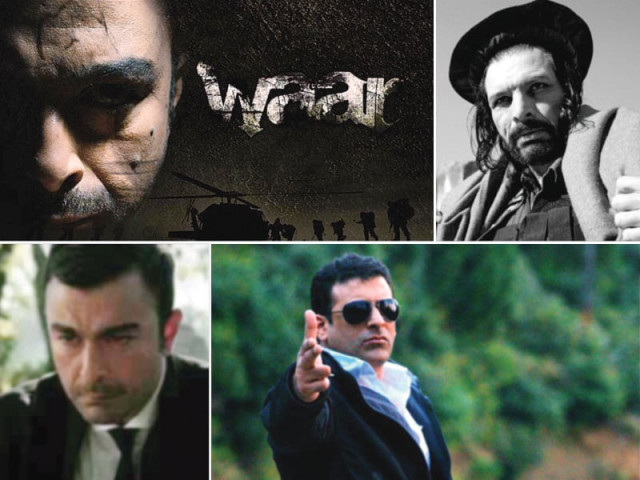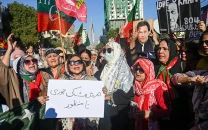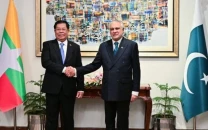Waar: All that glitters…
Shaan captivates with stellar acting despite a bland script.

Waar is propaganda that will confound an already confused nation. PHOTOS: FILE
No matter how clichéd the subject of your story is, a good script can always save the day but unfortunately, that doesn’t happen for Waar.
Waar is a film about Major Mujhtaba (Shaan), an ex-army officer who takes an early retirement from the forces due to personal reasons. A special police task force is trying to fight terrorism in the tribal areas with Ehtesham (Hamza Ali Abbasi) leading the field operations. His sister (Ayesha Khan) makes strategies for the team, which come to a standstill when they realise that Pakistan is about to be hit by a major terrorist attack and none but the retired Major Ehtesham can lead such a complex counter-terrorism operation.
On the political front, Ejaz Khan (Ali Azmat) talks about a positive change in Pakistani politics as he sits with some unnamed politicians who are actually Nawaz Sharif and Asif Ali Zardari look-alikes from the political parody Hum Sab Umeed Se Hain. The rest of the story oscillates around Pakistan’s sovereignty and the Indian agents who are trying to dismantle it.
The English script fails to do justice to Pakistan’s cultural manifestation, which cannot be aptly conveyed in any other language but Urdu. The film doesn’t have a single one-liner worthy of being remembered.
When penning down a script, one tends to ‘think’ and process dialogues in the mother tongue – which, for most Pakistani writers, including Dr Hassan Rana, is Urdu. This is why Dr Rana’s English scriptwriting comes across as hollow, lackluster and deficient in narrative finesse.
That, however, is not the primary concern. The real problem is the cultural inaccuracies and immaturity with which Pakistan’s gravest issue – terrorism – is addressed. It’s disheartening to see Pakistan’s most awaited film turn out to be a bland, peculiar and uninspiring piece of propaganda.
Post-bin Laden’s death, Hollywood has moved beyond the depiction of the “Big bad Arab”, and is now exploring and experimenting with villainous characters in films. We, on the other hand, find our mainstream narrative fixated on anatagonising India. The two RAW agents Ramal (Shamoon Abbasi) and Laxmi (Meesha Shafi) are shown to be the primary cause of all things bad and it’s the Indians who not only fund political murders but also suicide bomb attacks. The icing on the cake is that even the lady who does social work by day and seduces Pakistani politicians by night is a RAW agent. Sigh.
The only scenes where Urdu is spoken are those in Waziristan and the characters’ Pashto accent is so funny that even Umer Sharif can mimic a better accent than the one depicted in the film!
As for the actors, Shaan does a commendable job. Continuously evolving as an actor, he no longer sports, the gujjar image that we have known him for, and has become the most slick and sophisticated face of Pakistani cinema. He is undoubtedly at par with any mainstream artist from Hollywood or Bollywood.
Hamza Ali Abbasi is improving by the day and could prove to be an asset for Pakistani cinema. The remaining actors, including Shamoon, fall prey to a horrid script and both Meesha Shafi and Ali Azmat fail in their attempts at proving their acting skills.
Having said that, Waar is easily the most well-executed action thriller that has come out of this region. With cinematography and editing dealt with great care and attention, it has set the bar high for local and Bollywood action thrillers.
A grand-yet-controlled sound design is what keeps you glued to your seats in a film, and kudos to director Bilal Lashari for getting the balance between gunshots and dialogues right. The neck-breaking sound effect seems real and the shots fired from a Berretta are distinct from the ones fired from a Taurus pistol.
The underrated Qayyas provides an exceptional heavy metal soundtrack for the film and Umair Jaswal’s vocals take your breath away in a scene when the special operations team is practising the walk-in-fire technique.
Verdict: Watch Waar for a mind-blowing cinematic experience but don’t expect a discourse. This piece of pointless propaganda is going to further confuse an already puzzled nation about Pakistan’s outlook on counter-terrorism. In the long run, it will prove to be a great feature for Pakistani cinema but a damaging one for intellect.
Score: 3/5
Published in The Express Tribune, October 12th, 2013.
Like Life & Style on Facebook, follow @ETLifeandStyle on Twitter for the latest in fashion, gossip and entertainment.


















COMMENTS
Comments are moderated and generally will be posted if they are on-topic and not abusive.
For more information, please see our Comments FAQ